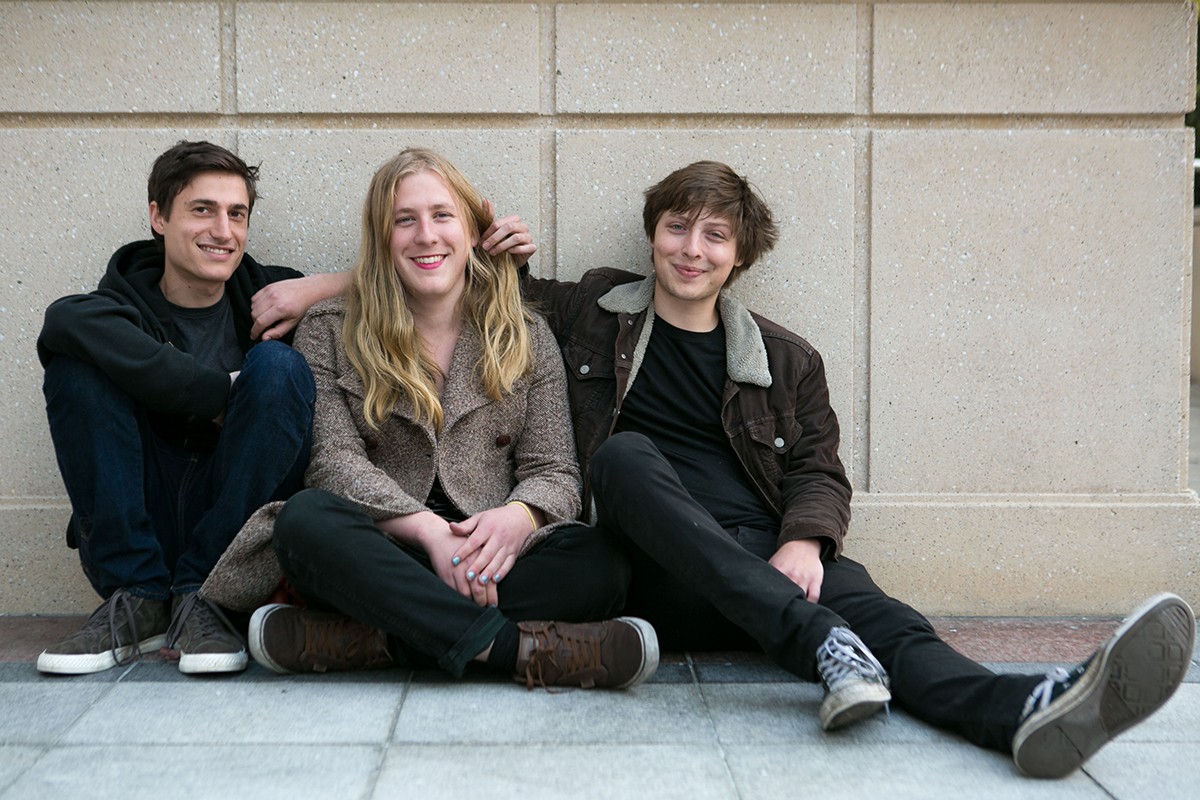I love the sound of breaking glass. So sang Nick Lowe on his 1978 solo debut. A lot of rock groups from the era concurred: Pere Ubu’s “Sentimental Journey” featured the sound of smashing recyclables, The Specials opened “Nite Klub” with the clinking and cracking of pint glasses, and Nastyfacts used screeching tires and a crash to arresting effect on “Drive My Car.” Last month’s May Day march in Oakland involved a lot of breaking glass, too. Floor-to-ceiling panes, laminated windshields, and tempered windows shattered on Broadway, and a group of field recordists called Bourgeois Speedball captured each blow in stereo.
One of them, Daniel Shubat, recently echoed Lowe’s old refrain: “I do love the sound of breaking glass.”
“Not to valorize that necessarily,” added one of his collaborators, Ian Brown, also known as Katsy Pline. “There’s something very captivating about someone specifically breaking the window of a Chase Bank, since those people were so involved in producing the recession of 2008. It’s very visceral, this sense of people who’ve been taken advantage of striking back.” Plus, Brown continued, “The sound itself is very full. The frequency range is across the spectrum.”
Shubat, Brown, and Danny Lewis sat last Friday night in the outdoor amphitheater in front of Oakland City Hall, which they referred to by the people’s handle: Oscar Grant Plaza. They were preparing to join a demonstration down the street against Mayor Libby Schaaf’s retrograde and legally dubious “protest curfew.” The group shared cigarettes, bottled water, an affinity for phrases such as “cultural production” and “material conditions,” and a commitment to investigating “the aesthetics of social movements.”
In practice, that involves gathering field recordings at protests. The group’s aims are documentary and creative: As the Field Recording Working Group, the trio compiles and distributes snippets of familiar chants and the incidental noises of civil unrest. As Bourgeois Speedball, the group samples and modulates the same sounds for use in songs. The typically ephemeral missives of rebellion harden into beats, texture, and vocal motifs. Then, Shubat said, Bourgeois Speedball looks to “politicize spaces that people engage with in an ostensibly apolitical way.”
In other words, a skittish house track such as “Abolish the Police” — composed of cut-up chants, footsteps as high-hat, clapping as low-end pulse, and your everyday table plummeting from a second-floor balcony to the sidewalk below as snare — is intended to plant seeds of insurrection in the linoleum dance floor.
“The chant in ‘Abolish the Police’ is from April 2, 2014,” Brown recalled. “Graduate students [at UC Santa Cruz] were on strike, protesting unfair labor conditions and unlawful intimidation. Twenty-three people got arrested that day.” The song’s other vocal sample — You’re just working class folks hired to kill other working class folks — is culled from a student protester’s lecture to the cops and modulated to the brink of intelligibility.
Now in their early twenties, the members of Bourgeois Speedball met as students in Santa Cruz. There, they participated in demonstrations against privatization of the UC system. The school awarded Bourgeois Speedball a $400 grant. Now based in Oakland, the group has documented dozens of local Black Lives Matter demonstrations since a grand jury declined to indict Officer Darren Wilson in the killing of Michael Brown in Ferguson, Missouri last fall.
In front of City Hall, Brown brandished a Tascam DR100. The group adheres to some guidelines, such as not recording individuals without consent, and Bourgeois Speedball typically abstains from joining in on the chants. It’s partly practical, because whoever is recording at a given moment must monitor levels on headphones. Plus, as white people, the group’s members said that it’s important to show solidarity while foregrounding the voices of the disenfranchised.
“Yeah, we don’t want to take up too much space,” Shubat said. “It’s more about holding space — a very attentive of way of holding space, documenting, and participating at once.”
Of course, sounds of protest elicit sounds of repression, such as circling helicopters, thwopping so-called “less-lethal” projectiles, and spewing teargas canisters, not to mention the cops’ so-called “sound cannon.” Considering that, Brown explained, Bourgeois Speedball’s practice is also an “attempt to re-appropriate those sounds into gestures of resistance.”
Bourgeois Speedball minds its predecessors. Brown referenced Sonic Warfare, a scholarly work on how sounds are set in the service of control and coercion. The book’s author, Steve Goodman, makes murky, leaden grime tracks as Kode9 and operates Hyperdub, the foremost platform for lauded Chicago footwork DJs, including Spinn and the late Rashad. His work underscores how closely intellectual life abuts semi-popular electronic music.
There’s a crude but useful notion gaining truck with music critics nowadays: Rock ‘n’ roll is stuck on the past, rap is focused on the present, and electronic music is fixated on the future. Bourgeois Speedball sees itself firmly in the latter camp, in the company of artists such as Holly Herndon, the local laptop auteur interrogating the digital age, and DJ Sprinkles, whose late-night deep-house sets unpack theses on queer theory and capitalism. The field recordists envision a cultural arena without a wall between aesthetic experience and political engagement, where clubs and festivals shed their strong associations with escapism.
Meanwhile, turnout for the curfew protest was weak. Perhaps slightly more relaxed, Brown and Shubat conceded, “Maybe we’re too serious,” and got candid about the group’s name. “Bourgeois Speedball” is lifted from the philosopher Paul Preciado (neè Beatriz). It’s supposed to point at the class dimension at play in distinguishing legal pharmaceuticals from street drugs. Still, “most of our friends hate it,” Brown said. “They think it’s too dumb, or too punk rock.”














